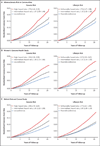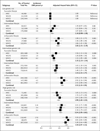Genetic Risk, Adherence to a Healthy Lifestyle, and Coronary Disease
- PMID: 27959714
- PMCID: PMC5338864
- DOI: 10.1056/NEJMoa1605086
Genetic Risk, Adherence to a Healthy Lifestyle, and Coronary Disease
Abstract
Background: Both genetic and lifestyle factors contribute to individual-level risk of coronary artery disease. The extent to which increased genetic risk can be offset by a healthy lifestyle is unknown.
Methods: Using a polygenic score of DNA sequence polymorphisms, we quantified genetic risk for coronary artery disease in three prospective cohorts - 7814 participants in the Atherosclerosis Risk in Communities (ARIC) study, 21,222 in the Women's Genome Health Study (WGHS), and 22,389 in the Malmö Diet and Cancer Study (MDCS) - and in 4260 participants in the cross-sectional BioImage Study for whom genotype and covariate data were available. We also determined adherence to a healthy lifestyle among the participants using a scoring system consisting of four factors: no current smoking, no obesity, regular physical activity, and a healthy diet.
Results: The relative risk of incident coronary events was 91% higher among participants at high genetic risk (top quintile of polygenic scores) than among those at low genetic risk (bottom quintile of polygenic scores) (hazard ratio, 1.91; 95% confidence interval [CI], 1.75 to 2.09). A favorable lifestyle (defined as at least three of the four healthy lifestyle factors) was associated with a substantially lower risk of coronary events than an unfavorable lifestyle (defined as no or only one healthy lifestyle factor), regardless of the genetic risk category. Among participants at high genetic risk, a favorable lifestyle was associated with a 46% lower relative risk of coronary events than an unfavorable lifestyle (hazard ratio, 0.54; 95% CI, 0.47 to 0.63). This finding corresponded to a reduction in the standardized 10-year incidence of coronary events from 10.7% for an unfavorable lifestyle to 5.1% for a favorable lifestyle in ARIC, from 4.6% to 2.0% in WGHS, and from 8.2% to 5.3% in MDCS. In the BioImage Study, a favorable lifestyle was associated with significantly less coronary-artery calcification within each genetic risk category.
Conclusions: Across four studies involving 55,685 participants, genetic and lifestyle factors were independently associated with susceptibility to coronary artery disease. Among participants at high genetic risk, a favorable lifestyle was associated with a nearly 50% lower relative risk of coronary artery disease than was an unfavorable lifestyle. (Funded by the National Institutes of Health and others.).
Figures




Comment in
-
Coronary artery disease: Nature versus nurture in coronary atherosclerosis.Nat Rev Cardiol. 2017 Jan;14(1):2-3. doi: 10.1038/nrcardio.2016.191. Epub 2016 Nov 24. Nat Rev Cardiol. 2017. PMID: 27883007 No abstract available.
-
The interplay between genetics, epigenetics and environment in modulating the risk of coronary heart disease.Ann Transl Med. 2016 Dec;4(23):460. doi: 10.21037/atm.2016.12.29. Ann Transl Med. 2016. PMID: 28090516 Free PMC article. No abstract available.
-
Genetic Risk, Lifestyle, and Coronary Artery Disease.N Engl J Med. 2017 Mar 23;376(12):1193-4. doi: 10.1056/NEJMc1700362. N Engl J Med. 2017. PMID: 28328342 No abstract available.
-
Genetic Risk, Lifestyle, and Coronary Artery Disease.N Engl J Med. 2017 Mar 23;376(12):1194. doi: 10.1056/NEJMc1700362. N Engl J Med. 2017. PMID: 28328343 No abstract available.
-
Genetic Risk, Lifestyle, and Coronary Artery Disease.N Engl J Med. 2017 Mar 23;376(12):1192-3. doi: 10.1056/NEJMc1700362. N Engl J Med. 2017. PMID: 28332385 No abstract available.
References
-
- Müller C. Xanthomata, hypercholesterolemia, angina pectoris. Acta Med Scand. 1938;89:75–84.
-
- Gertler MM, Garn SM, White PD. Young candidates for coronary heart disease. J Am Med Assoc. 1951;147:621–625. - PubMed
-
- Marenberg ME, Risch N, Berkman LF, Floderus B, de Faire U. Genetic susceptibility to death from coronary heart disease in a study of twins. N Engl J Med. 1994;330:1041–1046. - PubMed
MeSH terms
Grants and funding
LinkOut - more resources
Full Text Sources
Other Literature Sources
Medical
